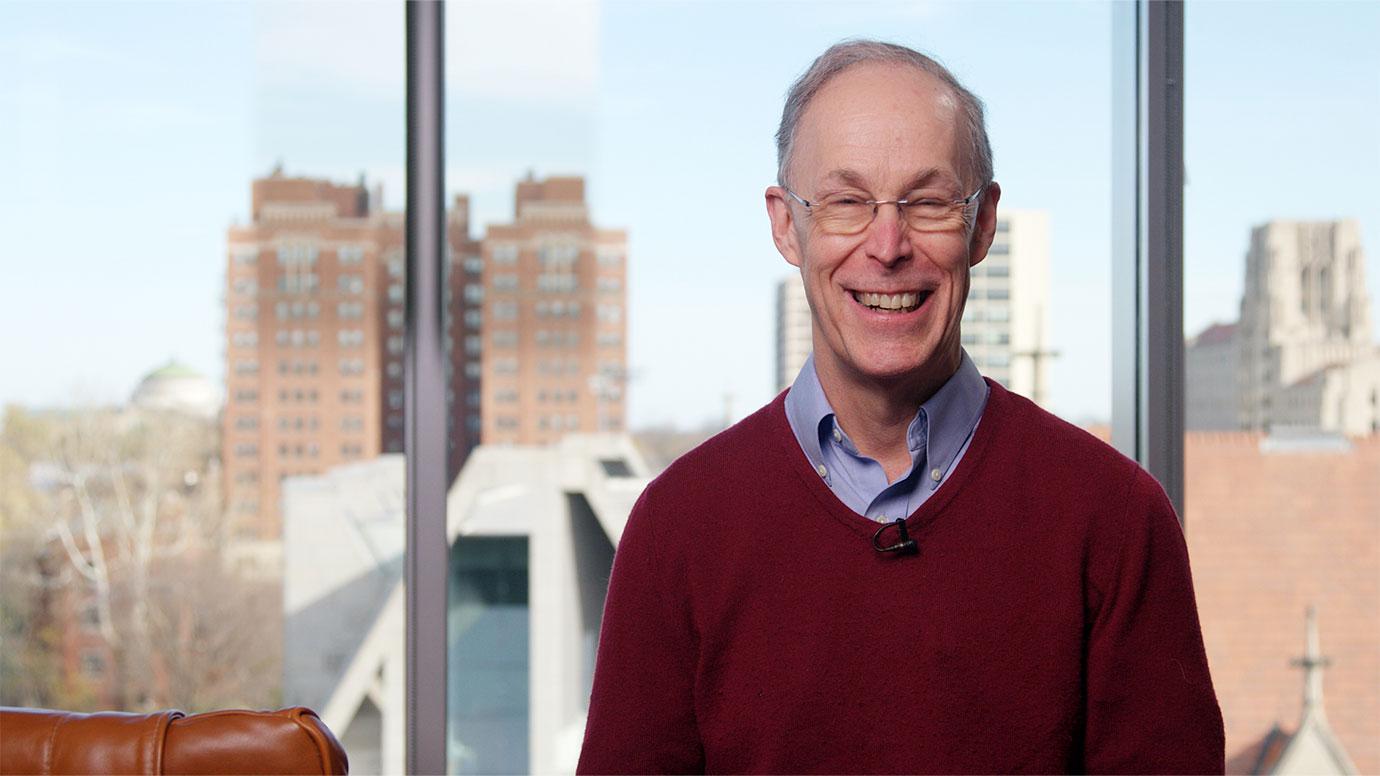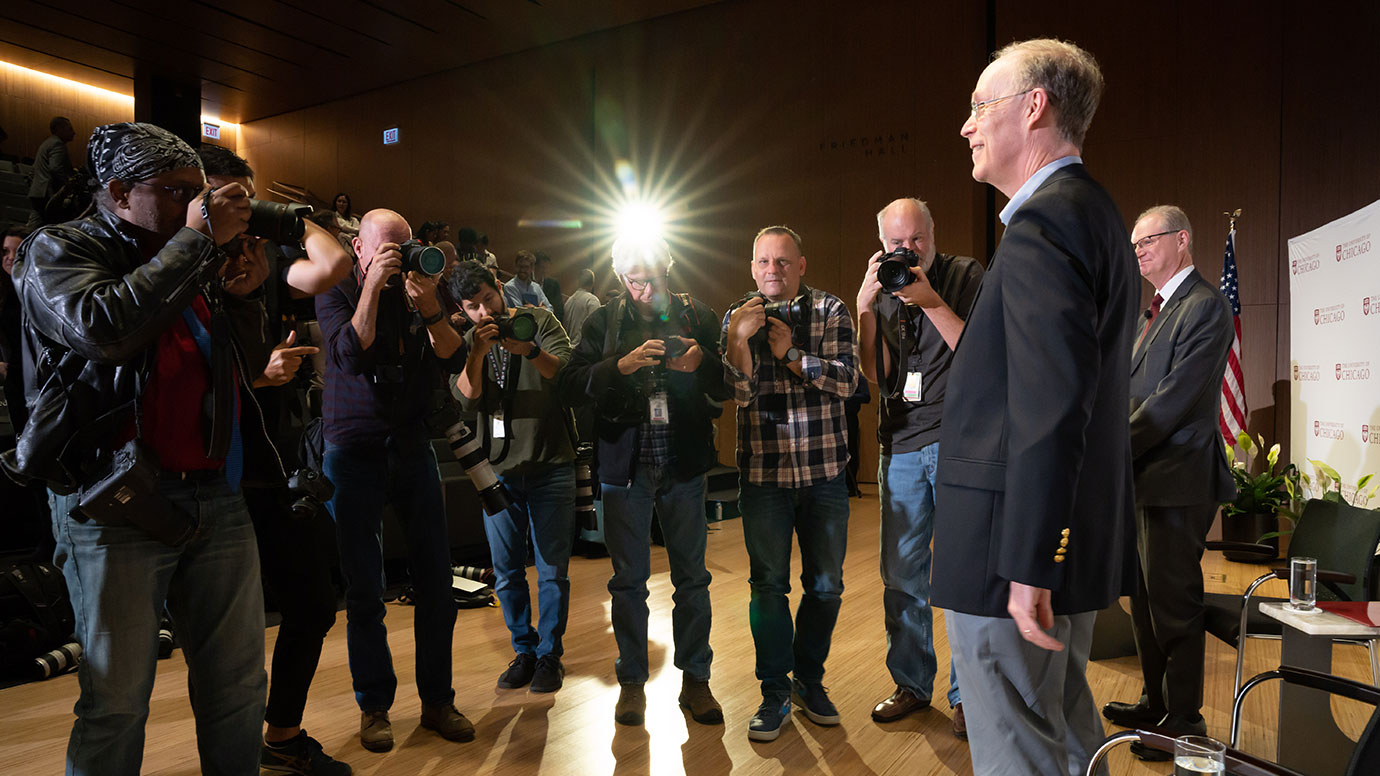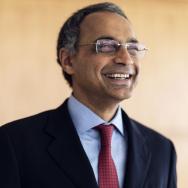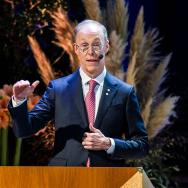When Prof. Douglas Diamond joined the University of Chicago faculty in 1979, he was surrounded by some of the leading figures in the field of economics: Eugene Fama, Merton Miller, Robert Lucas and George Stigler, to name a few—all of whom would one day win Nobel Prizes.
While it was an “intimidating” place to be an economist, Diamond said it was the ideal intellectual environment to begin his scholarly career.
“I figured this was a very low-stress place to come as a junior faculty member because there was absolutely a zero percent chance I was ever going to get tenure here,” said Diamond, the Merton H. Miller Distinguished Service Professor of Finance at the University of Chicago Booth School of Business. “So that took a lot of the pressure off; I was just going to do the best work I could do, realizing that if I wouldn’t make the standard, I’d get fired. And as it turned out, I didn’t get fired. And I’ve been here ever since.”
For the past four decades, Diamond focused his research on understanding the role of banks in the economy, particularly during financial crises. His groundbreaking ideas, including his paper creating a model for bank runs and liquidity, established Diamond as the founder of modern banking theory.
This past October, Diamond joined the ranks of UChicago’s Nobel laureates—becoming the 33rd economist associated with the University to win the honor. He won the Sveriges Riksbank Prize in Economic Sciences in Memory of Alfred Nobel, along with former U.S. Federal Reserve Chairman Ben Bernanke and longtime collaborator Philip Dybvig of Washington University in St. Louis. On Dec. 8, Diamond will deliver his Nobel lecture (watch here at 7 a.m. CT), and on Dec. 10, he will receive the Nobel Prize in a lavish award ceremony with the king of Sweden (watch both on the Nobel website).
Photo gallery 1/5
Building a model for banks
Diamond became interested in banking as an undergraduate at Brown University, when he took a course on Milton Friedman’s and Anna Schwartz’s landmark book: A Monetary History of the United States. The 1963 work examined how banking crises and poor policy by the Federal Reserve contributed to the Great Depression.
One of the two papers cited by the Nobel Foundation was from Diamond’s doctoral dissertation. That paper, “Financial Intermediation and Delegated Monitoring,” appeared in the Review of Economic Studies in 1984. It explained that the highly levered structure of banks (financing themselves with deposits that are debt) is required when the monitor borrows on behalf of their depositors. In addition, banks must be large and well diversified. This was the first explanation of this important structure that banks use. The delegated monitoring generated a conflict of interest between bankers and depositors, while the monitoring of borrowers reduced the conflict of interest between banks and the borrowers.
Diamond continued to work on understanding the structure and importance of banking once he finished graduate school. “When I first started working on banking, I didn’t necessarily plan to spend a career on it,” Diamond said. “I’d read about how the bank failures in the United States in the 1930s contributed to the severity of what could have been a pretty big recession and turned it into the Great Depression, and I thought that was tremendously interesting. But [Friedman’s and Schwartz’s] description of how the damage from the bank failures was done … seemed like it might be incomplete.”
“When I first started working on banking, I didn’t necessarily plan to spend a career on it.”
This concern led to a joint project to understand the instability of the banking system with Dybvig, a former classmate from graduate school at Yale University.
Diamond and Dybvig had plenty of time to discuss economics as students of legendary economist Steve Ross. “Steve didn’t take appointments for his students—you had to sit outside his door and hope he had some free time,” Diamond said. “So Phil and I sat on the stoop talking about various things, and we decided we should do a project together in the future.”
That project resulted in “Bank Runs, Deposit Insurance and Liquidity,” a groundbreaking paper that appeared in the Journal of Political Economy in 1983. The paper introduced the influential Diamond-Dybvig model, a framework that explains the factors that cause bank runs, outlines the consequences of such failures and explores ways to stop them from happening.
“In the old days, people thought bank runs had something to do with not having enough currency in the vault of a bank,” Diamond said. “The point of all of my models is that even in a modern financial system that doesn’t have issues of not enough currency, you can still have bank runs.”
Preparing for Nobel week
The Diamond-Dybvig model will be central to Diamond’s Nobel lecture, which he’s been busy working on for the past month.
“It’s a little stressful; there’s various ways one could treat this. You’re supposed to talk about the research that you did, and then have it be understandable by people who are not necessarily research economists,” Diamond said. “But I also want to say something research economists didn’t necessarily already know from reading my papers.”
Sitting in his office on the fifth floor of Chicago Booth on a recent fall afternoon, Diamond thought back to his early days at the University. He fondly remembered the “walk-in closet” of an office he first occupied as a junior faculty member, and the colleagues at Chicago Booth and the Department of Economics who encouraged him early in his career by reading his research papers and providing him pointed commentary.
“We all take our each other’s research very seriously, so we all go to seminars and listen and try to make sure there aren’t any holes in the research,” Diamond said. “We’re all sort of research-aholics here. This is part of our fun—doing the research.”
After the Nobel ceremony, Diamond will continue teaching graduate students and working on new research. With inflation surging and talk of a global recession building, the role of banks will continue to be scrutinized.
“I think this research area is still incomplete, and I hope more people keep thinking about it,” Diamond said. “But the thing I’m most excited about is that this is still an important area where we only know this much.”
—This story includes content previously published on the Chicago Booth website.
















